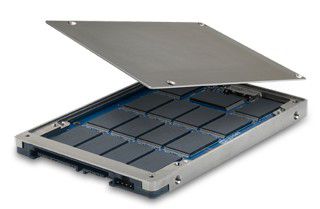- Qualcomm Launches Snapdragon 4 Gen 2 Mobile Platform
- AMD Launches Ryzen PRO 7000 Series Mobile & Desktop Platform
- Intel Launches Sleek Single-Slot Arc Pro A60 Workstation Graphics Card
- NVIDIA Announces Latest Ada Lovelace Additions: GeForce RTX 4060 Ti & RTX 4060
- Maxon Redshift With AMD Radeon GPU Rendering Support Now Available
Seagate Introduces Pulsar SLC Solid-State Disks
Like most other mechanical hard drive vendors, Seagate has long remained adamant that from a consumer standpoint, solid-state disks (SSDs) are just not that important. Western Digital said the same thing even at the beginning of this year, and then look what happened. Like Seagate, Western Digital’s stance on who SSDs are good for isn’t much different. But unlike Western Digital, Seagate planned to stick to its guns by marketing its new Pulsar drives as “enterprise” offerings.
Seagate proves it with the fact that the Pulsar is an SLC-only offering. For those unaware, or who forget, SLC is the highest-end version of NAND found in SSDs, and as it’s 1-bit-per-cell, it not only has a longer lifespan, it can deliver far faster speeds. The downside, is that because it’s 1 bpc, you also have to pay more for less, in terms of overall density. Of the launch drives, Seagate is offering the Pulsar in 50GB, 100GB and 200GB sizes.
Compared to consumer SSDs currently on the market, the Pulsar drives boast some sweet specs, including a 240MB/s sequential read speed, and 200MB/s sequential write. While this is faster than most other SSDs on the market ,it’s not that much faster, but perhaps there’s some hidden goodness in here that we’re not quite aware of. If the random speed proved better than most other drives on the market, that’s one thing that would set it apart.
So… the downside. It doesn’t look like the Pulsar is going to become available to the regular consumer soon, and for that reason, pricing isn’t mentioned in the press release. Rather, Seagate is going to offer the drives exclusively to OEMs, meaning that most likely, the only way to get one would be to include it in a configured PC from a company like Dell. To be fair though, Western Digital has had its SiliconDrive SSDs available for months, and I haven’t been able to find those on sale anywhere. It really seems like both companies are trying to wait as long as possible before releasing consumer drives, so they can say, “Ok, now SSDs make sense for the regular consumer”.

The Pulsar SSD delivers the necessary performance, reliability, and endurance to match the application environments of enterprise blade and general servers. It achieves a peak performance of up to 30,000 read IOPS and 25,000 write IOPS, 240MB/s sequential read and 200 MB/s sequential write. Its SLC-based design optimizes reliability and endurance and helps provide a .44% AFR rating with a 5-year limited warranty. As an additional safeguard, the Pulsar drive leverages Seagate’s enterprise storage expertise to protect against data loss in the event of power failure.
| Source: Seagate Press Release |
Discuss: Comment Thread
|




